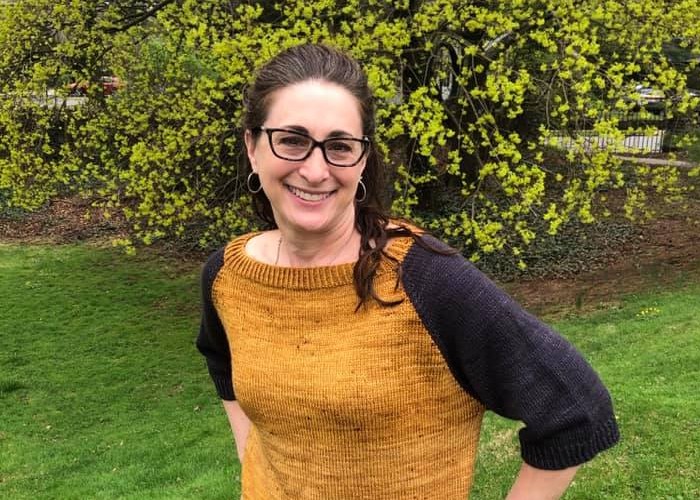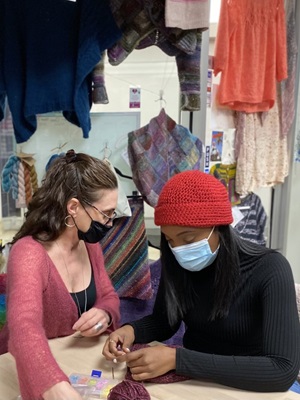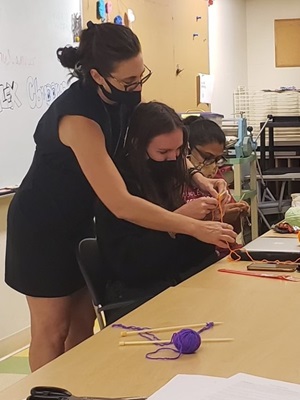Spreading the Therapeutic Art of Knitting: Meet Ellen Rubin '92
By Sarah Hojsak

Ellen Rubin, BS biology '92, started a nonprofit to share the scientifically-backed mental and physical health benefits of knitting and fiber arts with the community members who need it most.
December 23, 2022
Luv2Knit & More in Jenkintown, PA is busy on a Friday afternoon in December. Customers browse shelves stacked tall with brightly colored skeins of yarn, but this is more than a typical yarn shop.
Ellen Rubin, BS biology ‘92, opened Luv2Knit & More in 2017 after teaching knitting at other yarn stores, local libraries, art centers and her children's school. Although she had a successful career as an immunologist and cancer researcher, a series of life hardships made her realize that life was too short not to follow her dream of opening a knitting and crochet store of her own—one with a mission of giving back to the community.
As a scientist, Rubin was drawn to knitting because of its scientifically-backed mental and physical health benefits. Studies show that knitting can help reduce anxiety and depression, ease stress, lower blood pressure, distract from chronic pain and contribute to an overall increased sense of well-being. Her goal is to help others learn the therapeutic art, especially those who need it most.
Rubin’s store, Luv2Knit & More, works hand in hand with the nonprofit, Therapeutic Craftcare (TCC), which focuses on outreach to diverse groups that would benefit from learning knitting, crochet and other fiber arts. She has worked with teenagers in foster care, veterans, cancer patients and those dealing with depression and anxiety, with plans to expand outreach to more vulnerable groups that can benefit from these skills.
Establishing the nonprofit with her partners was her goal from the beginning, but she knew the visibility of a storefront would help build the momentum necessary to start it. “The brick-and-mortar store started so that we could demonstrate what we're doing, which is teaching people for the therapeutic benefit,” Rubin explained. “We really are on a big mission to make the world a better place.”
Rubin found that demand for a knitting community was high. Luv2Knit and TCC have gradually grown over the last few years, mostly by word of mouth. Rubin leads the nonprofit with partners Yolanda Pressley (who was formerly the Assistant Director of Admissions at Drexel University College of Medicine), and Devra Pulley (who led a forensic engineering business with her father, Drexel '54), as well as a team of volunteers which they hope to expand in the future.
“Our main goal has been to make sure that we disseminate information about the therapeutic benefits of knitting, crochet and fiber arts in general,” explained Pressley. “We are so excited about what we've been able to accomplish, but now we want to provide more outreach, information and access to what we offer.”
Luv2Knit offers more than you’ll find at a big box craft store, including step-by-step support, special orders, private lessons and group events. But at the end of the day, according to Rubin, it’s not really about the knitting itself, but the community that has formed around it and the sense of pride and accomplishment it instills. She credits her Drexel experience with teaching her how to think creatively and look at the world differently, a foundation that led her to focus on combining her love of knitting with helping others. “I'm no longer shy about talking with people about what I do, and the purpose of it,” Rubin said. “I’m very passionate about sharing how knitting can help people.”
Read more about Rubin’s journey in the Q&A below.
 Rubin offers step-by-step support for learning how to knit.
Rubin offers step-by-step support for learning how to knit.
What inspired you to start knitting?
I started knitting about 23 years ago. It was something that I had always wanted to learn. I had learned how to crochet from my grandmother when I was younger. She's really the inspiration for this whole thing. When I was a co-op student at Drexel working for SmithKline Beecham (now GSK), I would crochet on my way to my job because I'm not one to waste time and I don't sit still very well. I had always said, ‘One day, I want to learn how to knit.’ But finally, I just said, ‘That's it. I need to.’ Back then there wasn't YouTube, so I studied it like I studied organic chemistry. I picked up a big, thick book and I studied and studied and gradually worked on harder projects. What led me to teach knitting was really wanting to help people. I think of it as exponential. If you teach one person, then you teach another person, and thereby that can really impact many people.
You had a very different career before you made Luv2Knit and Therapeutic Craftcare full-time. Why did you take the leap?
After losing people that were dear to me, I didn't want to live life knowing that I had this really great idea, but I was too scared to try it. When I was presented with the opportunity to open a brick-and-mortar store, I had no assets to start a business, but I received help in so many ways to take the leap of faith and try it. The end goal was to have a nonprofit, but the nonprofit wouldn't be successful without the store—no one would really know about it. I needed to find dedicated people who said, ‘This is a great idea. I want to be a part of it. I want to volunteer. I want to teach people.’
Who can benefit from the therapeutic qualities of knitting or crochet?
All different groups of people can benefit. I work with autistic individuals and foster kids in Philadelphia. At CHOP, I worked with one of our volunteers who is an occupational therapist that specializes in stroke patients and we worked with kids that had cerebral palsy. I worked with a school where kids had social and emotional difficulties, and I've expanded now to work with people that have intellectual disabilities. It really can benefit all populations. It's about more than just knitting, because it helps people on such a different level. When my friend was having blood transfusions because of cancer, she would tell me how knitting would help her forget what was going on in her life. You get into this place of flow where you’re just kind of zen with the universe.
What does a typical day look like for you?
We've been in business for a little over five years. I would generally have group classes, but during the pandemic I shifted to mainly doing private lessons. A typical day involves meeting with clients and giving them lessons, but also trying to schedule time where I can just help them with their projects. Every other Thursday we have a ‘come hang out and knit and crochet’ night. My work varies day to day, and that's been a big adjustment for me after working in a laboratory. I have a lot of help from volunteers and other people, but still there's always something to be done.
 Anyone can benefit from the therapeutic qualities of knitting, says Rubin.
Anyone can benefit from the therapeutic qualities of knitting, says Rubin.
What is the most rewarding part of your job?
People have said to me, ‘Ellen, you've changed my life. I don't know what I’d do without my knitting.’ Helping people is rewarding. I had a client who suffers from anxiety and depression who was recently injured in a fall, so I made a house call and helped her get back on track with her work. She later wrote to me, ‘I knitted myself out of my depression.’ I hear that sort of thing a lot, so that's why I like to say it's not really about the knitting. The sense of pride and accomplishment is transformative. When I do programs with kids, at the end of it they’re running around and saying, ‘Look what I made. Look what I did.’ There's no greater joy than that.
How do you apply what you learned at Drexel to your career now?
Drexel trained me how to think as a scientist, how to look at the world differently. My co-ops were formative, as well as the fact that there were short terms—you had to learn to use your time wisely. I think the co-op program is amazing, and that's why I was really happy when my oldest daughter decided to attend Drexel. It teaches you how to think creatively, which definitely helped me with making the career switch. I have a natural excitement for learning new things, and thinking as a scientist is very different from thinking as a businessperson. Drexel really was the starting point for me.
Some people might think learning to knit is hard, and they wouldn’t be any good at it. What advice would you give them?
Anything new that you learn is hard, and not everyone learns the same way. If somebody wants to learn to knit, I think they have to understand it’s going to be frustrating. I would get fed up with making mistakes, but once I embraced that part, I realized it's a lot like life. You're going to make mistakes, but it may be easier to fix knitting mistakes—and you can learn from them, too. People will say, ‘I don't have the patience to knit.’ I try to explain to them that I am not a patient person—it's actually knitting and crochet that helps me to be patient. I’ve taught people with intellectual disabilities; I taught a woman who was legally blind and deaf how to make socks. You have to have the desire to learn, and the wherewithal to make mistakes and be tenacious. I’ve had some really tough things happen in my life. You just have to pick yourself up and put one foot in front of the other and just keep moving forward. The reward for something like this is immense.